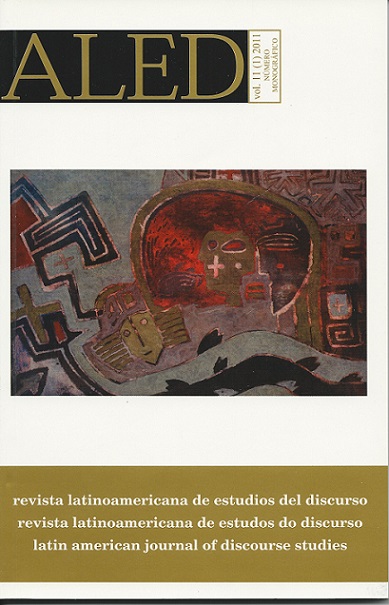Usos del lenguaje evaluativo en el planteamiento del problema del artículo de investigación
Keywords:
formulating the problem. research article. evaluative language.Abstract
Stating the problem is an essential component of the research article, as it unveils the new knowledge the research is expected to generate and conveys the purpose of this academic genre. However, disciplines vary with respect to how the problem is presented. The purpose of the current study is to compare the resources used to specify and problematize the object of study in research articles in various disciplines (economics, education, environmental studies, philosophy, physics, medicine and psychology). It is expected that evaluative language plays an important role in the discursive construction of the problem to be addressed, given that, in this process, the author takes a particular stance towards the phenomenon under study as well as towards the related research on the topic. Thus, the present study focuses on the evaluative resources used in formulating the problem. The findings suggest that these resources do not vary much from one discipline to the other. The object of study is specified, in most cases, using a limited number of fixed expressions (e.g. el objetivo fundamental del presente trabajo es…) and it is problematized by using evaluative resources which highlight the importance of the problem and its possible contributions to the discipline.
Downloads
References
Bachelard, G. (1984). La formación del espíritu científico. México: Siglo XXI.
Beke, R. y Bolívar, A. (2009).Certainty and commitment in the construction of academic knowledge in the humanities. En E. Suomela-Salmi (ed.) Cross linguistic and cross cultural perspectives on Academic Discourse, pp. 33-47. Amsterdam: John Benjamins.
Bhatia, V. (2004). Worlds of written discourse. A genre-based view. London: Continuum.
Blanco, C. E. y Briceño Velazco, Y. (2006). El discurso de la investigación educacional Los resúmenes de las ponencias de la UCV en la AsoVAC. Boletín de Lingüística 18 (26): 33-62.
Bolívar, A. (2001). The negotiation of evaluation in written text. En M. Scott & G. Thompson (Eds.), Patterns of text. In honour of Michael Hoey, pp.129- 158. Amsterdam: John Benjamins.
Bolívar, A. (2004). Análisis crítico del discurso de los académicos. Revista Signos, 37 (55): 7-18.
Bolívar, A. (2006). La función de la evaluación en artículos y ensayos humanísticos. En J. Falk, J. Gille y F. Bermúdez (coords.), Discurso, interacción e identidad, pp. 109-136. Estocolmo: Universidad de Estocolmo.
Bolívar, A. y Beke, R. (2000). El discurso académico en inglés para investigadores en humanidades: el caso de los abstracts. Cuadernos de Lengua y Habla 2: 95-119.
Bolívar, A., Beke, R. y Shiro, M. (2010). Las marcas lingüísticas del posicionamiento en las disciplinas; Estructuras, voces y perspectivas discursivas. En G. Parodi (ed.). Alfabetización académica y profesional en el siglo XXI: leer y escribir desde las disciplinas, pp. 95-126. Santiago de Chile: Ariel.
Du Bois, J. (2007). The stance triangle. En R. Englebretson (ed.). Stancetaking in discourse. Subjectivity, evaluation, interaction, pp. 139-182. Amsterdam: John Benjamins.
Ferrari, L. y Gallardo, S. (2006). Estudio diacrónico de la evaluación en las introducciones de artículos científicos de medicina. Revista Signos, 39 (61): 161-180.
Haggan, M. (2004). Research paper titles in literature, linguistics and science: dimensions of attraction. Journal of Pragmatics, 36: 293-317.
Hunston, S. (1994). Evaluation and organization in academic discourse. En M. Coulthard (ed.). Advances in written text analysis, pp.191-218. London: Routledge.
Hunston, S. (2000). A local grammar of evaluation. En S. Hunston y G. Thompson (eds.). Evaluation in text. Authorial stance in the construction of discourse, pp.74-101. Oxford: Oxford University Press.
Hunston, S. y J. Sinclair (2000). Evaluation and the planes of discourse: Status and value in persuasive texts. En S. Hunston y G. Thompson (eds.). Evaluation in text. Authorial stance in the construction of discourse, pp.176-207. Oxford: Oxford University Press.
Hyland, K. (1998). Persuasion and context: The pragmatics of academic metadiscourse. Journal of Pragmatics 30: 437-455.
Labov, W. (1972). Language in the inner city. Philadelphia: University of Pennsylvania Press.
López, C. (2006). Marcas de subjetividad y argumentación en tres géneros especializados del español. Revista Signos, 39 (61): 205-229.
Ramírez Gelbes, S. (2011). Títulos de ponencias, ethos y desagentivación: de diferencia y similitudes entre disciplinas. En M. M. García Negroni, B. Hall, S. Ramírez Gelbes y C. Tosi. Los discursos del saber. Prácticas discursivas y enunciación académica, pp. 67-100. Buenos Aires: Editorial del Calderón.
Shiro, M. (1997). Labov’s model of narrative analysis as an emerging study in discourse. Journal of Narrative and Life History, 7: 309-314.
Shiro, M. (2006). ¿Cómo plantear un problema de investigación? El caso de los géneros discursivos. En L. Molero de Cabeza, A. Franco y L. Vieira,
L. (eds.). Estudios del discurso en Venezuela. Teoría y método, pp. 299-308. Maracaibo: FONACIT-FUNDACITE-ZULIA.
Shiro, M. (2008). La construcción del punto de vista en los relatos orales de niños en edad escolar. Un análisis discursivo de la modalidad. Caracas: Universidad
Central de Venezuela.
Swales, J. (1981). Aspects of article introductions. Birmingham: The University of Aston.
Swales, J. (1990). Genre analysis. English in academic and research settings. Cambridge, UK: Cambridge University Press.
Swales, J. (2004). Research genres. Explorations and applications. Cambridge, UK: Cambridge University Press.
van Dijk, T. (1980). Estructuras y funciones del discurso. México: Siglo XXI.
van Dijk, T. (1989). La ciencia del texto. Barcelona: Paidós.
Downloads
Published
How to Cite
Issue
Section
License

This work is licensed under a Creative Commons Attribution-NonCommercial-NoDerivatives 4.0 International License.
The authors retain the copyright and guarantee RALED the right to be the first publication of the work as well as a Creative Commons Attribution License that allows others to share the work with recognition of authorship and the initial publication in this journal.




